Last June, I was invited to speak at the 25th anniversary celebration of the National Institute of Arthritis and Musculoskeletal and Skin Diseases (NIAMS). My talk, entitled “Meeting the Grand Challenges: Bold Ideas; Bold, Smart People; Organizations that Believe,” was based on my firm belief that we need those three things to successfully tackle challenges in medicine. Other keynote speakers included Professor Helen Lu, my former fellow at Drexel who is Associate Professor of Biomedical Engineering at Columbia University. I thank NIAMS for providing ongoing financial support for our research and for having the courage to believe in bold ideas. My talk was recently placed online. Please visit Meeting the Grand Challenges. I welcome your comments. Thank you.
Month: December 2011
A Bold, New Research Initiative
Recently, the National Science Foundation (NSF) Science and Technology Center Program reviewed our grant p re-proposal and invited us to develop a full application. It was particularly exciting for us because we scored in the top 10% of all submissions.
If the NSF approves our application, a unique center, focused on a regenerative engineering approach to complex tissue and organ regeneration, will be established with a base here at UConn. The proposed studies will assist in designing strategies to transition from individual tissues to complex organ regeneration. This program will focus on the integration of stem cell technology, regenerative biology, and Biomaterials science. Having a dedicated center will bring basic science, engineering, and medicine together under one umbrella. Our hope is that we will develop practical strategies which will ultimately lead to whole limb regeneration.
Congratulations to all the investigators who are participating in this proposal!
Featured Fellow of the Institute for Regenerative Engineering: Dr. Kevin Wai Hong Lo
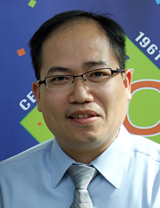 Dr. Lo is a fellow who’s been in my team since 2008. He was born in Hong Kong and received his Ph.D. degree in Biochemistry from Hong Kong University of Science and Technology. Dr. Lo’s research interests include musculoskeletal tissue engineering, drug delivery, regenerative medicine, biomaterials, biochemistry, and cell molecular biology. Dr. Lo has been an outstanding fellow and it’s been great to have the opportunity to mentor him. His research contributions are reflected in his nineteen papers published in high-impact journals which have been highly cited by other investigators. Dr. Lo submitted several grant applications to funding agencies and two of the applications were recently funded. Dr. Lo also serves as an independent reviewer for a number of international peer-review journals.
Dr. Lo is a fellow who’s been in my team since 2008. He was born in Hong Kong and received his Ph.D. degree in Biochemistry from Hong Kong University of Science and Technology. Dr. Lo’s research interests include musculoskeletal tissue engineering, drug delivery, regenerative medicine, biomaterials, biochemistry, and cell molecular biology. Dr. Lo has been an outstanding fellow and it’s been great to have the opportunity to mentor him. His research contributions are reflected in his nineteen papers published in high-impact journals which have been highly cited by other investigators. Dr. Lo submitted several grant applications to funding agencies and two of the applications were recently funded. Dr. Lo also serves as an independent reviewer for a number of international peer-review journals.
Specific areas of Dr. Lo’s interest include:
1. Develop bone-inducing small molecules for bone regenerative engineering.
2. Develop targeted drug delivery system for osteoporosis.
3. Evaluate the therapeutic potential of using molecular motors as nano-scale motor vehicles to deliver drugs and/or genes intracellularly.
4. Investigate the signaling pathway mechanism underlying bone regeneration in cells and tissues.
Happy Holidays from the Director of the Institute for Regenerative Engineering
Dear Colleagues,
We are nearing the end of a very successful year for students, fellows, and faculty at the Institute for Regenerative Engineering. I thank everyone for their hard work and enthusiasm. Please enjoy a happy and safe holiday season. I wish you and yours all the best in 2012.
With warm regards,
Cato T. Laurencin, M.D., Ph.D.
University Professor
Albert and Wilda Van Dusen Distinguished Professor of Orthopaedic Surgery
Professor of Chemical, Materials and Biomolecular Engineering
Chief Executive Officer
Connecticut Institute for Clinical and Translational Science
Director, Institute for Regenerative Engineering
University of Connecticut
MRS Opening Invited Speech
Last week, I had the privilege of giving the opening invited speech for the Biomaterials and Tissue Regeneration Symposium at the Materials Research Society in Boston. I spoke about our Institute’s work in building matrices for bone regeneration using polymeric materials and ceramics. I focused on some of our new theories regarding the design of matrix systems that can be inductive for Bone. I want to thank my co-authors of this work and I also want to provide a special thanks to Professor Mei Wei who invited me to give the lecture at the meeting.
American Institute of Chemical Engineers
I recently attended the American Institute of Chemical Engineers (AICHE) meeting where I was elected a Fellow of the Institute. Previously I was named one of the 100 Chemical Engineers of the Modern Era by the AICHE for my work in the design of polymer-ceramic systems for bone repair and regeneration. An award such as that is only possible with the support of a large number of students and colleagues who have worked with me over the past years. Some of the earliest individuals included Dr. Hoda Elgendy, Dr. Maria Norman, and Dr. Mohammed Attawia my first fellows, and Dr. Carol Morris, my first graduate student. They joined my lab at M.I.T. when I was still an orthopaedic surgery resident and worked on some of the seminal studies in the field. To them, and others, I give my thanks.
Third World Academy of Sciences
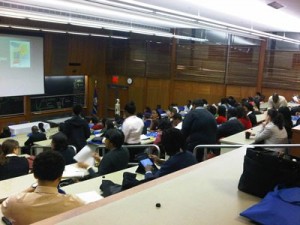 I had the great fortune to meet with the leaders of the African Academy of Sciences (Dr. Mohamed Hassan, President) and the Third World Academy of Sciences Dr. C.N.R. Rao, former President) at its recent annual meeting. I discussed our new National Science Foundation Science and Technology Center application and have asked them both to join our advisory board. Our Institute has forged collaborations with institutions in India which have included the exchange of students. In addition, faculty in our Institute have been involved in the establishment of the African Institute of Science and Technology. I am very proud of our Institute’s work in the international arena in teaching and research.
I had the great fortune to meet with the leaders of the African Academy of Sciences (Dr. Mohamed Hassan, President) and the Third World Academy of Sciences Dr. C.N.R. Rao, former President) at its recent annual meeting. I discussed our new National Science Foundation Science and Technology Center application and have asked them both to join our advisory board. Our Institute has forged collaborations with institutions in India which have included the exchange of students. In addition, faculty in our Institute have been involved in the establishment of the African Institute of Science and Technology. I am very proud of our Institute’s work in the international arena in teaching and research.
Helen I. Moorehead-Laurencin, M.D., Sex and Gender Forum 2011 at Drexel University
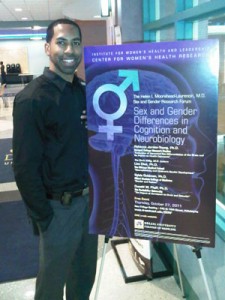 I was really excited to attend the Helen I. Moorehead-Laurencin, M.D., Sex and Gender Forum at Drexel University. Now in its 10th year, the Forum honors the memory of my mother, an extraordinary physician who worked in the inner city of Philadelphia. Dr. Helen Laurencin was very passionate about clinical care, research and education, and served as a quiet leader for the community. The Forum, sponsored by the Institute for Women’s Health and Leadership at Drexel, is a fitting tribute to her work and her legacy. Attending the Forum was the next generation member of the Laurencin medical family, Sam Laurencin. He is completing an M.D. at Drexel Medical School, and his Ph.D. in Chemical Engineering. Sam plans to enter a career as an academic orthopaedic surgeon.
I was really excited to attend the Helen I. Moorehead-Laurencin, M.D., Sex and Gender Forum at Drexel University. Now in its 10th year, the Forum honors the memory of my mother, an extraordinary physician who worked in the inner city of Philadelphia. Dr. Helen Laurencin was very passionate about clinical care, research and education, and served as a quiet leader for the community. The Forum, sponsored by the Institute for Women’s Health and Leadership at Drexel, is a fitting tribute to her work and her legacy. Attending the Forum was the next generation member of the Laurencin medical family, Sam Laurencin. He is completing an M.D. at Drexel Medical School, and his Ph.D. in Chemical Engineering. Sam plans to enter a career as an academic orthopaedic surgeon.
I am very grateful to the leadership of Drexel including Lynn Yeakel, Dr. Michelle Follen, and Dr. Sandra Urdaneta Hartmann for putting on such a fine program.
U.S.-India Collaboration
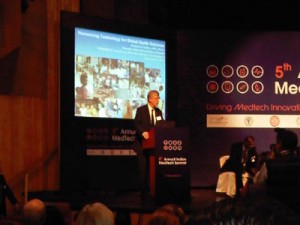
I recently participated in collaborative meetings between the U.S. and India on developing new innovative affordable technologies for treatment of diseases. The meeting took place in New Delhi. The meeting was opened by Dr. Francis Collins, Director of the National Institutes of Health who gave an outstanding lecture on new affordable medical devices fostered by N.I.H. funded research.
Our Institute has been very involved in collaborative activities in India. Professor Swami Sethuranum, Dean at SASTRA University in India received his Ph.D. from our group, while Professor Dhirendra Katti of the Indian Institute of Technology in Kanpur was a postdoctoral fellow and Assistant Professor with us. Currently Dr. Lakshmi Nair of the Institute for Regenerative Engineering is a co-Investigator on a major grant under the U.S.-Indo Forum.
While in India I had the opportunity to meet with Michael Cheetham, the Director of the U.S.-Indo Forum who has collaborated with our group for over 15 years. The program in New Delhi was sponsored by his organization, and we are grateful for his support.
Featured Faculty of the Institute for Regenerative Medicine: Professor Lakshmi Nair
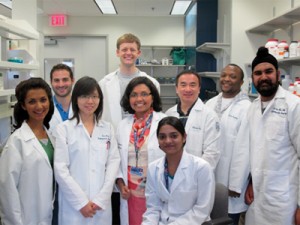 Dr. Nair is an assistant professor who’s been at our institute since its start. She received her education from India. She did her postdoctoral training in my group at Drexel University and the University of Virginia before joining us in her current position. Her research interests include hydrogels, nanotechnology, and tissue engineering. She has more than 50 archival publications in the areas of biomaterials, drug delivery, injectable hydrogels, and tissue engineering.
Dr. Nair is an assistant professor who’s been at our institute since its start. She received her education from India. She did her postdoctoral training in my group at Drexel University and the University of Virginia before joining us in her current position. Her research interests include hydrogels, nanotechnology, and tissue engineering. She has more than 50 archival publications in the areas of biomaterials, drug delivery, injectable hydrogels, and tissue engineering.
Dr. Nair’s current research program in our Institute centers on identifying unique biologically active molecules and developing biofunctional biomaterial constructs as artificial tissue microenvironments which can favorably modulate cellular responses to promote tissue regeneration and/ repair as well as for eliciting host immune defense to promote tumor regression. Their working hypothesis is that bio-functional biomaterials that can activate specific cell signaling pathways can be developed and when appropriately controlled can play a significant role in accelerating tissue regeneration as well as creating an immuno-active microenvironment for tumor regression. Specifically, her approaches to regenerative biomaterials include:
A. Design and Development of bio-functional polymeric systems.
B. Development of injectable biofunctional biomaterials as bioactive artificial cell microenvironment.
C. Understanding the immuno-modulatory functions of biofunctional biomaterials.
D. Understanding the activation of signal transduction pathways in musculoskeletal cells and immune cells in the presence of bio-functional biomaterials.
E. Evaluating the efficacy of the biofunctional biomaterials using in vivo animal models.
Dr. Nair’s laboratory is well-funded and is currently supported by two US-army grants aimed at understanding the immuno-modulatory functions of biofunctional injectable materials and to control their properties to support bone and cartilage tissue regeneration. The research is also funded by CSTC to develop injectable regenerative biomaterials as cell delivery vehicle for bone regeneration. She is the principal investigator on these grants. In addition she is a co-investigator on a Connecticut Stm Cell Institute grant to develop injectable hydrogels for cartilage regeneration using induced pluripotent stem cells (iPSC’s).
Nationally, Dr. Nair is involved in a number of organizations. She is an associate editor of the Journal of Biomaterials and Tissue Engineering and sits on the editorial board for the Recent Patents in Biomedical Engineering and Journal of Biomedical Nanotechnology and serves as a reviewer for more than 30 peer reviewed journals. She also serves on grants panels for federal agencies such as NSF, NIH (adhoc member), Department of Veterans affairs (appointed to the Scientific Merit Review Board) and for international agencies such as Hong Kong Research Grant Council, Israel Science Foundation and Indo-US Science & Technology Forum.